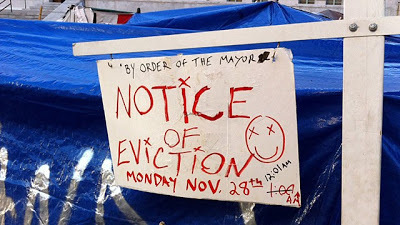Why Occupy Movements Unattached to Any Political Party Are The Only Hope for Real Change

Why Occupy Movements Unattached to AnyPolitical Party Are The Only Hope for Real Change by Mark Naison | special to NewBlackman
Now that Occupy Movements are being evicted frompublic parks in cities throughout the country, almost invariably by Democraticmayors, many Democratic Party organizes and some labor activists are hoping themovement will fade away and concentrate its energies on electing progressivecandidates for office and putting forth a progressive political agenda.
In my opinion, that would be a gravemistake. There are a bevy of important issues that given currentpolitical alignments, and the power of money in American politics, cannotbe translated into a viable legislative agenda. It will take years of disruptiveprotest- strikes, boycotts, walkouts, sit ins and occupations- to place them onthe national agenda and the only force in American society capable of employing those tactics for a sustained period is the Occupy movement.
Here are some key issues that neither party iswilling to take on that the Occupy movement can influence if it keeps growingand becoming more diverse in the next five years.
1. The student loan crisis and the escalatingcost of a college education. There is no way, without major disruptions ofuniversity life, and pressure on the banks, that student loan debt can beerased, or significantly reduced, and tuition at public colleges frozen orlowered. Until universities cannot carry on their normal business withoutmaking dramatic changes in loan collections and tuition charges, you can besure elected officials won't touch these issues with a ten foot pole.
2. The legalization of drugs and the release ofnon-violent drug offenders from the nation's prisons. Given the powerful interestsfighting any dismantling of the prison industrial complex-ranging from prisonguards unions, to elected officials in communities where prisons are located,to corporations who benefit from cheap prison labor, it will require massivesocial movements, to force states, localities, and eventually the federalgovernment, to end the irrational arrest and imprisonment of people who selldrugs no more dangerous than alcohol or prescription medications.
3. The dismantling of a domestic police stateapparatus which uses advanced weaponry and intrusive surveillance technology tosuppress dissent and control and intimidate minority and working class youth. The weapons that were used against Occupy demonstrators in Oakland, atZuccotti Park and at UC Davis have been used for many years against minorityyouth to prevent them from inhibiting the gentrification and re-segregation ofAmerican societies and to assure order in schools and communities stripped ofresources. Libertarians, civil rights organizations, and a growing Occupymovement can create an alliance to undermine the domestic policestate. The two major parties will never do it without immense outside pressure.
4. A moratorium on foreclosures andthe passage of legislation to allow arts groups, youth groups, affordablehousing organizations and advocates for the homeless to occupy abandonedcommercial and residential space in America's towns and cities. Such actionswill only be taken if Occupy groups and their allies make foreclosures difficult,and begin occupying abovementioned properties in such numbers that it will becounterproductive for authorities to evict them. There is no way electedofficials will take such steps without being presented with a "fait accompli"by protesters.
5. A radical reformation of the tax system thatplaces the burden of taxation on the 1 Percent and reduces taxes on individualsand small businesses. There is no way, given current politicalalignments, and the vast power of corporate and Wall Street lobbies, thatthat such a revolution in the tax code could be legislated. But five more yearsof disruptive protest could change that Occupy movements have to create ascenario where the only path to restoring social order would be a revision ofthe tax burden to benefit ordinary citizens
These five policy areas are hardly the only oneswhich would require years of protest to attain-I am sure people reading thiscould identify issues in education, environmental protection, job creation andUS military policy that would require movements of equal force to implement
But I have identified these five areas to showhow far away we are from any real political change in this country through thetwo major parties We need grass roots social movements of such force thatit will reinvent what is possible in mainstream American politics. The Occupymovements have started such a process. It would be a shame if they prematurelyembraced the electoral process rather than pushing protests activity to muchhigher levels.
***
MarkNaison is a Professor of African-American Studies and History at FordhamUniversity and Director of Fordham's Urban Studies Program. He is the author oftwo books, Communists in Harlem Duringthe Depression and White Boy: AMemoir. Naison is also co-director of the BronxAfrican American History Project (BAAHP). Research from the BAAHP will bepublished in a forthcoming collection of oral histories Before the Fires: An Oral History of African American Life From the1930's to the 1960's.
Published on November 28, 2011 19:29
No comments have been added yet.
Mark Anthony Neal's Blog
- Mark Anthony Neal's profile
- 30 followers
Mark Anthony Neal isn't a Goodreads Author
(yet),
but they
do have a blog,
so here are some recent posts imported from
their feed.



